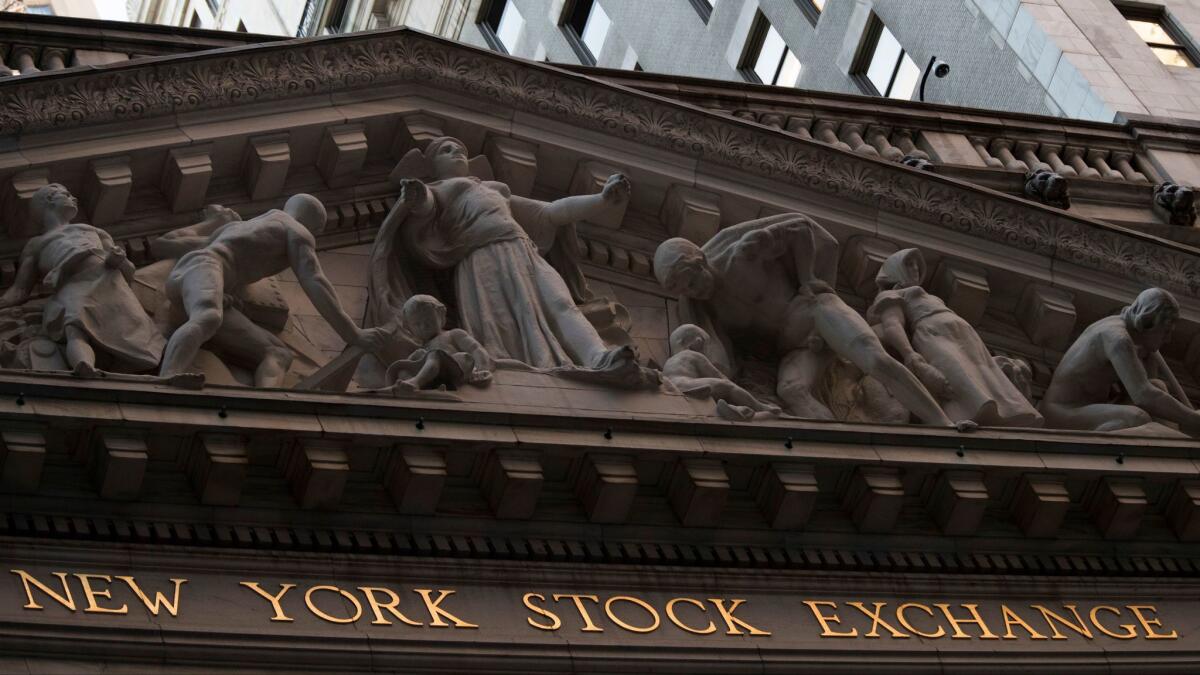Stocks fall after Federal Reserve’s plans reverse early rally

- Share via
A big rally in U.S. stocks evaporated Wednesday as the Federal Reserve appeared to struggle with questions related to inflation and government policy and suggested it might start trimming its balance sheet later in the year.
Stocks had jumped early after payroll processor ADP said private U.S. businesses added 263,000 jobs in March, which was more than analysts expected.
Read more: U.S. companies continue strong hiring »
The Dow Jones industrial average was up as much as 198 points, and the Nasdaq composite reached an all-time intraday high. Industrial and energy companies made some of the largest gains.
But stocks halted their advance and started falling two hours before the close, when the Federal Reserve disclosed the minutes from its March policy meeting. The minutes showed Fed officials discussing plans to reduce the central bank’s bond holdings this year and disagreeing over whether it would be safe to let inflation rise faster and how to deal with the economic impact of President Trump’s stimulus ideas.
Read more: Fed minutes reveal debate over inflation and Trump »
The Standard & Poor’s 500 index ended down 7.21 points, or 0.3%, to 2,352.95. The Dow fell 41.09 points, or 0.2%, to 20,648.15. The Nasdaq slid 34.13 points, or 0.6%, to 5,864.48. The Russell 2000 index of small-company stocks sank 16.03 points, or 1.2%, to 1,352.14.
The Federal Reserve bought trillions of dollars in bonds during the financial crisis of 2008-09 in an effort to stimulate the economy. When its bonds mature, it has continued to buy new ones. But now, the Fed may stop buying new bonds when older ones mature, which would gradually shrink the size of its holdings.
That sent bond prices surging and yields tumbling. The yield on the 10-year Treasury note fell to 2.33% from 2.36%. When bond yields fall, interest rates fall with them. That tends to hurt banks because it means reduced profits on lending, and bank stocks took the largest losses Wednesday. JPMorgan Chase dropped 1.3% to $86.19.
For the last couple of months it seemed investors and the Fed understood each other well, as the central bank indicated it intended to keep raising interest rates gradually if the economy continued to grow at a steady clip. But the uncertainty reflected in the Fed’s March meeting may challenge that understanding.
Also on Wednesday, soup and sandwich chain Panera jumped 14.2% to $312.94 after it agreed to be acquired by JAB Holding of Europe for $315 a share. JAB has quietly become a rival to Starbucks in recent years; it owns or has large stakes in brands including Peet’s Coffee & Tea, Caribou Coffee, Stumptown Coffee, Keurig Green Mountain and Krispy Kreme Doughnuts. Panera climbed recently thanks to rumors of a deal. A month ago, it was trading at $230 a share.
Read more: JAB snaps up Panera Bread for more than $7 billion »
Early Wednesday, U.S. and European regulators approved the sale of Swiss agribusiness Syngenta to ChemChina. ChemChina will have to sell some businesses to complete the $43-billion deal, but those rulings may have made investors more hopeful that two other giant chemical deals will be approved.
Dow Chemical and DuPont, which plan to combine, both went up. Dow Chemical rose 32 cents to $63.52 and DuPont rose 67 cents to $80.47.
Monsanto reported profit and sales that were far better than analysts expected, saying profits from its corn and soybean businesses grew in its fiscal second quarter. The company also backed its forecasts for the year and said its sale to Bayer of Germany should close by the end of the year. The stock rose 1% to $115.31.
Greenbrier jumped 10% to $47.25 after the maker of railroad freight car equipment announced a bigger profit and better sales than analysts expected. It also said rail traffic is growing and announced a $1-billion agreement with a key customer.
U.S. crude oil rose 12 cents to $51.15 a barrel in New York. Brent crude, the international standard, rose 19 cents to $54.36 a barrel in London.
Wholesale gasoline stayed at $1.72 a gallon. Heating oil rose 1 cent to $1.60 a gallon. Natural gas fell 3 cents to $3.27 per 1,000 cubic feet.
Gold sank $9.90 to $1,248.50 an ounce. Silver fell 14 cents to $18.19 an ounce. Copper rose 7 cents, or 2.6%, to $2.68 a pound. Those moves reflected investors’ earlier optimism, as the metals’ trading ends before stock trading does.
The dollar rose to 110.86 yen from 110.65 yen. The euro fell to $1.0667 from $1.0670.
The FTSE 100 index in Britain gained 0.1%. France’s CAC 40 lost 0.2% and the DAX in Germany fell 0.5%. Japan’s Nikkei 225 index gained 0.3% and Hong Kong’s Hang Seng advanced 0.6%. The Kospi of South Korea finished little changed.
ALSO
Richmond Fed President Lacker resigns, admitting role in leak to analyst
Westech College’s abrupt closure raises questions about training options
Changes to H-1B visa policy could have a chilling effect on the tech industry
UPDATES:
2:55 p.m.: This article was updated with closing prices and context.
This article was originally published at 1:10 p.m.
More to Read
Inside the business of entertainment
The Wide Shot brings you news, analysis and insights on everything from streaming wars to production — and what it all means for the future.
You may occasionally receive promotional content from the Los Angeles Times.










